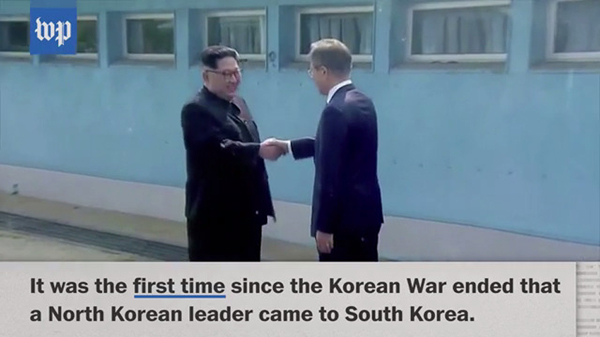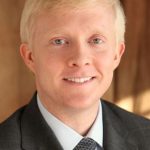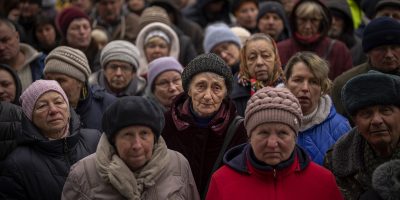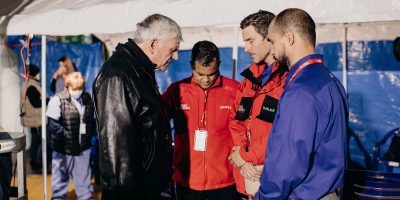the prospect of peace between the two Koreas is 'like a dream'
Korea summit: historic, but human rights talk ‘absent’

by David Roach
PANMUNJOM, South Korea, April 27, 2018 (BP) — A historic meeting today (April 27) between the leaders of North and South Korea left religious liberty advocates optimistic about peace on the Korean Peninsula but pessimistic about the advance of human rights in the North.
Paul Kim, Asian American advisor to the Southern Baptist Convention Executive Committee, said the prospect of peace between the two Koreas is “like a dream” and what many South Koreans have prayed for daily through several decades — though human rights violations in North Korea continue to be a major concern, including Christians in North Korean prison camps who “are treated like animals.”
Olivia Enos, an Asia analyst with the conservative Heritage Foundation, said human rights issues were “noticeably absent” from the agenda when South Korean President Moon Jae-in met with North Korean leader Kim Jong Un.
Meeting in the South Korean border village of Panmunjom, Kim and Moon promised to end the Korean War and repeated their countries’ previous vow to rid the Korean Peninsula of nuclear weapons. But, according to media reports, they did not announce specific steps toward that goal. Yet the meeting was notable as a precursor to U.S. President Donald Trump’s anticipated meeting with Kim and because Kim became the first North Korean leader to enter South Korea since the Korean War.
Paul Kim, pastor emeritus of Anitoch Baptist Church in Cambridge, Mass., told Baptist Press hundreds of thousands of Christians in South Korea have for decades gathered daily at 5 a.m. to pray. Their petitions have included reunification of the Koreas and peace.
Though the Korean War stopped in 1953, the peninsula technically remains in a state of war.
“This meeting” between Kim and Moon “is very [historic],” said Paul Kim, a South Korea native. “To me, it’s like a dream, where God’s people have prayed and God has answered in His time. It’s just awesome.”
Still, Paul Kim remains cautious about the future because he said North Korea has not always spoken truthfully during talks with the South. Any reunification, he said, must include improvement of human rights in the North and cannot occur solely on North Korea’s terms.
“We want to be … one nation under God,” Paul Kim said of Korea. “Christ should be the center.”
North Korea — named by persecution watchdog Open Doors as the world’s worst persecutor of Christians for the past 17 years — has sent thousands of Christians to its political prison camps, estimated at 50,000-70,000 by Open Doors. A 2015 SBC resolution on “religious persecution and human rights violations in North Korea” notes that “an estimated 200,000 to 400,000 Christians in North Korea remain at grave risk of persecution.”
Enos told BP denuclearization, peace and economic engagement were the priorities when Moon met with Kim Jong Un. South Korea’s foreign minister announced “that human rights issues would not be raised at the summit,” Enos said, “and as far as I’ve seen, it doesn’t look like they were raised at all.”
The “one bright spot,” Enos said, is that there appears to be “a higher likelihood that the Trump administration might raise” issues of human rights and religious liberty if Trump meets with Kim in the coming weeks.
Enos recommended the Trump administration call for the dismantling of all North Korean prison camps and ask for access to one or two prison camps to deliver humanitarian aid. The administration, she said, should have conditioned any meeting with Kim on the release of the three American citizens in North Korean custody: agriculture researcher Kim Hak-song, accountant Tony Kim and businessman Kim Dong-chul.
Though the three American prisoners share a common surname, they are not related.
Kim Jong Un “is violating the image of God in man through the prison camp system,” “public executions” and in other ways, Enos said.
“It’s time for the church to call on the Trump administration” to “move the needle” on human rights, including religious liberty, in North Korea, Enos said.
The SBC’s 2015 resolution “appeal[ed] to Kim Jong Un and the government of North Korea to respect and ensure human rights for all individuals,” urged then-President Obama “and both houses of the US Congress to do all they can to pressure the government of North Korea to respect the dignity and religious freedom of all its citizens” and renewed a call for prayer “that God will turn the heart of Kim Jong Un to Himself and that President Kim might grant to all the people of North Korea the respect they deserve as God’s creation.”
The original story can be found at: http://www.baptistpress.com/50795/korea-summit–historic-but-human-rights-talk-absent
Reprinted from Baptist Press (www.baptistpress.com), news service of the Southern Baptist Convention.

David Roach
David Roach is chief national correspondent for Baptist Press, the Southern Baptist Convention's news service. BP reports on missions, ministry and witness advanced through the Cooperative Program and on news related to Southern Baptists' concerns nationally and globally.




Comments are Closed